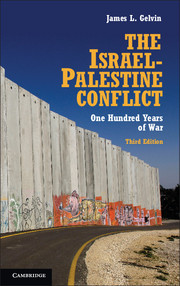Book contents
- Frontmatter
- Contents
- List of Illustrations and Maps
- Author's Note
- 1 The Land and Its Lure
- 2 Cultures of Nationalism
- 3 Zionism and the Colonization of Palestine
- 4 World War I and the Palestine Mandate
- 5 From Nationalism in Palestine to Palestinian Nationalism
- 6 From the Great Revolt through the 1948 War
- 7 Zionism and Palestinian Nationalism: A Closer Look
- 8 The Arab-Israeli Conflict
- 9 The Palestinian National Movement Comes of Age
- 10 Coming Full Circle: Oslo and Its Aftermath
- Glossary
- Time Line of Events
- Biographical Sketches
- Index
- References
10 - Coming Full Circle: Oslo and Its Aftermath
- Frontmatter
- Contents
- List of Illustrations and Maps
- Author's Note
- 1 The Land and Its Lure
- 2 Cultures of Nationalism
- 3 Zionism and the Colonization of Palestine
- 4 World War I and the Palestine Mandate
- 5 From Nationalism in Palestine to Palestinian Nationalism
- 6 From the Great Revolt through the 1948 War
- 7 Zionism and Palestinian Nationalism: A Closer Look
- 8 The Arab-Israeli Conflict
- 9 The Palestinian National Movement Comes of Age
- 10 Coming Full Circle: Oslo and Its Aftermath
- Glossary
- Time Line of Events
- Biographical Sketches
- Index
- References
Summary
From December 1992 through August 1993, an unofficial delegation of Israelis (acting with the knowledge of their foreign ministry) met with a delegation of Palestinians in Oslo, Norway. In talks hosted by the Norwegian foreign minister and his wife, they hammered out a formula for peace between Israelis and Palestinians, known ever since as the Oslo Accord. Once the negotiators had put together a general framework, they presented it for official consideration. From Rhodes in 1949 to Madrid in 1991, the path leading to peace had been littered with the remains of failed attempts to bring about a settlement. What made the Oslo negotiations revolutionary was their configuration: Rather than engaging Israel and its neighbors through either the Rhodes or conference formats, the Oslo format brought together Israelis and Palestinians in face-to-face negotiations for the first time. By reducing the conflict to its most elemental level – a conflict between the two peoples, both of which claimed the right to inhabit and control some or all of Palestine – the Oslo negotiations brought the century-old struggle full circle.
It was no coincidence that the Arab-Israeli phase of the Zionist/Israeli–Palestinian conflict began at the dawn of the Cold War and ended soon after American president George H. W. Bush and Soviet president Mikhail Gorbachev pronounced the Cold War over. While the Arab-Israeli conflict certainly played itself out according to its own internal logic, just as certainly the Cold War rivalry between the two superpowers played a significant role in driving and sustaining the conflict.
- Type
- Chapter
- Information
- The Israel-Palestine ConflictOne Hundred Years of War, pp. 231 - 268Publisher: Cambridge University PressPrint publication year: 2014



